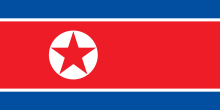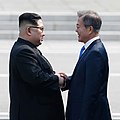Portal:North Korea
 The North Korea Portal The North Korea PortalIntroduction North Korea, officially the Democratic People's Republic of Korea (DPRK), is a country in East Asia. It constitutes the northern half of the Korean Peninsula and borders China and Russia to the north at the Yalu (Amnok) and Tumen rivers, and South Korea to the south at the Korean Demilitarized Zone (DMZ). The country's western border is formed by the Yellow Sea, while its eastern border is defined by the Sea of Japan. North Korea, like its southern counterpart, claims to be the sole legitimate government of the entire peninsula and adjacent islands. Pyongyang is the capital and largest city. The Korean Peninsula was first inhabited as early as the Lower Paleolithic period. Its first kingdom was noted in Chinese records in the early 7th century BCE. Following the unification of the Three Kingdoms of Korea into Silla and Balhae in the late 7th century, Korea was ruled by the Goryeo dynasty (918–1392) and the Joseon dynasty (1392–1897). The succeeding Korean Empire (1897–1910) was annexed in 1910 into the Empire of Japan. In 1945, after the Japanese surrender at the end of World War II, Korea was divided into two zones along the 38th parallel, with the north occupied by the Soviet Union and the south occupied by the United States. In 1948, separate governments were formed in Korea: the socialist and Soviet-aligned Democratic People's Republic of Korea in the north, and the capitalist, Western-aligned Republic of Korea in the south. North Korean invasion of South Korea in 1950 started the Korean War. In 1953, the Korean Armistice Agreement brought about a ceasefire and established a demilitarized zone (DMZ), but no formal peace treaty has ever been signed. Post-war North Korea benefited greatly from economic aid and expertise provided by other Eastern Bloc countries. However, Kim Il Sung, North Korea's first leader, promoted his personal philosophy of Juche as the state ideology. Pyongyang's international isolation sharply accelerated from the 1980s onwards as the Cold War came to an end. The fall of the Soviet Union in 1991 then brought about a sharp decline to the North Korean economy. From 1994 to 1998, North Korea suffered a famine with the population continuing to suffer from malnutrition. In 2024, the DPRK formally abandoned efforts to peacefully reunify Korea. North Korea is a totalitarian dictatorship with a comprehensive cult of personality around the Kim family. Amnesty International considers the country to have the worst human rights record in the world. Officially, North Korea is an "independent socialist state" which holds democratic elections; however, outside observers have described the elections as unfair, uncompetitive, and pre-determined, in a manner similar to elections in the Soviet Union. The Workers' Party of Korea is the ruling party of North Korea. According to Article 3 of the constitution, Kimilsungism–Kimjongilism is the official ideology of North Korea. The means of production are owned by the state through state-run enterprises and collectivized farms. Most services—such as healthcare, education, housing, and food production—are subsidized or state-funded. North Korea follows Songun, a "military first" policy which prioritizes the Korean People's Army in state affairs and the allocation of resources. It possesses nuclear weapons. Its active-duty army of 1.28 million soldiers is the fourth-largest in the world. In addition to being a member of the United Nations since 1991, North Korea is also a member of the Non-Aligned Movement, G77, and the ASEAN Regional Forum. (Full article...) Selected article -A number of country and international bodies have imposed international sanctions against North Korea. Currently, many sanctions are concerned with North Korea's nuclear weapons programme and were imposed after its first nuclear test in 2006. North Korea was the most sanctioned country in the world before the Russian Invasion of Ukraine. North Korea has had many sanctions from various countries such as: The United States, The European Union, The United Nations, Canada, Australia, Switzerland, Norway, India, Israel, Russia, China, South Korea, and Japan. The United States imposed sanctions in the 1950s and tightened them further after international bombings against South Korea by North Korean agents during the 1980s, including the Rangoon bombing and the bombing of Korean Air Flight 858. In 1988, the United States added North Korea to its list of state sponsors of terrorism. Sanctions against North Korea started to ease during the 1990s when South Korea's then-liberal government pushed for engagement policies with the North. The Clinton administration signed the Agreed Framework with North Korea in 1994. However, the relaxation was short-lived; North Korea continued its nuclear program and officially withdrew from the Nuclear Non-Proliferation Treaty in 2003, causing countries to reinstate various sanctions. UN Security Council Resolutions were passed after North Korea conducted nuclear tests in 2006, 2009, 2013, 2016, and 2017. Initially, sanctions were focused on trade bans on weapons-related materials and goods but expanded to luxury goods to target the elites. Further sanctions expanded to cover financial assets, banking transactions, and general travel and trade. (Full article...) CategoriesRelated portalsCommunist countries in Asia Other countries North Korea in the news
Selected image -
North Korean women performing at the Pyongyang Restaurant in Phnom Penh.
Did you know (auto-generated)
More did you know
General images -The following are images from various North Korea-related articles on Wikipedia.
North Korea topicsThings you can do
Associated WikimediaThe following Wikimedia Foundation sister projects provide more on this subject:
Web resources
Notes Discover Wikipedia using portals
|













































